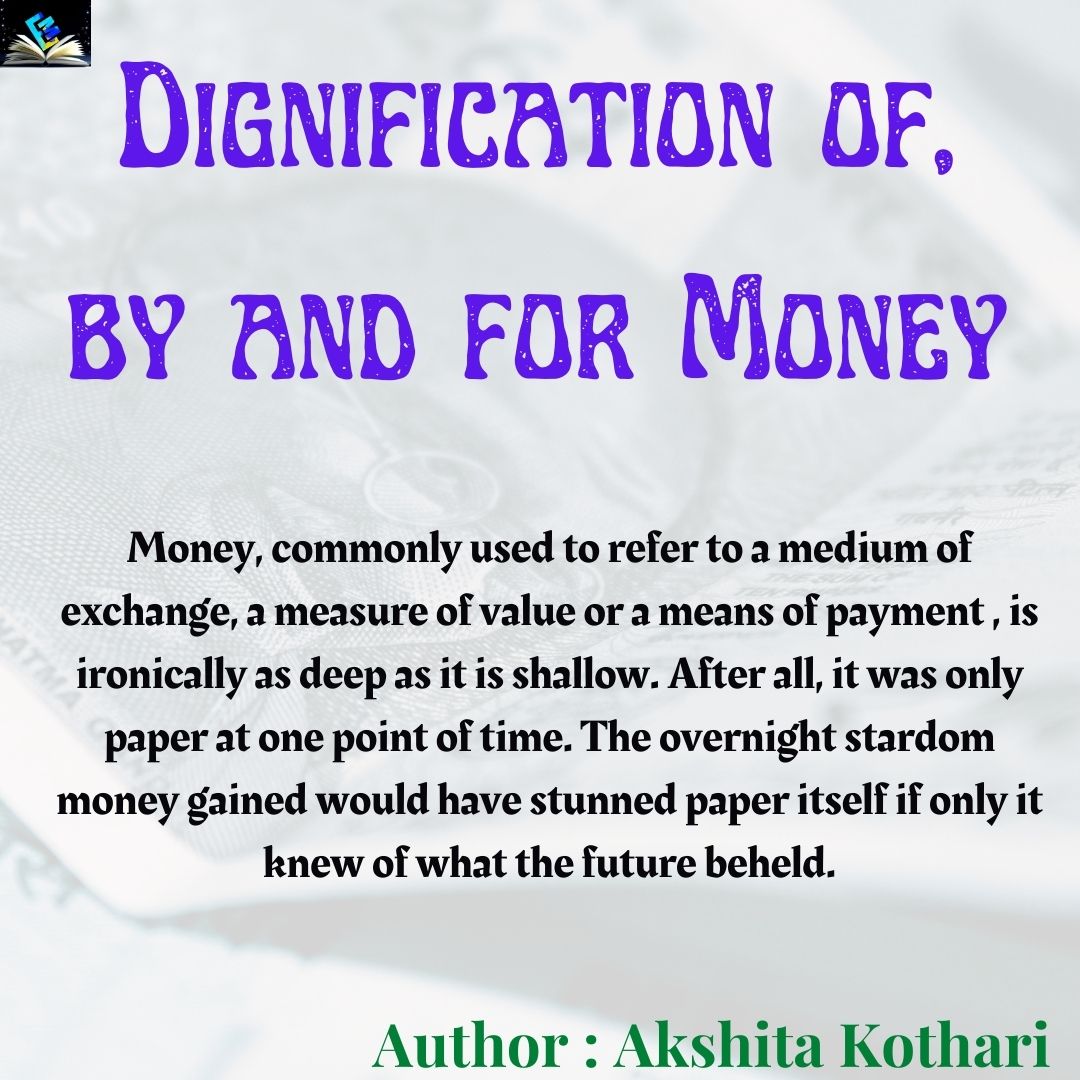
Dignification of, by and for Money
Money, commonly used to refer to a medium of exchange, a measure of value or a means of payment [2], is ironically as deep as it is shallow. After all, it was only paper at one point of time. The overnight stardom money gained would have stunned paper itself if only it knew of what the future beheld.
Author: Akshita Kothari
“Money dignifies what is frivolous if unpaid for”, said Virginia Woolf [1] and so blatantly did she state the founding principle of the venal world humankind so proudly created. Money, commonly used to refer to a medium of exchange, a measure of value or a means of payment [2], is ironically as deep as it is shallow. After all, it was only paper at one point of time. The overnight stardom money gained would have stunned paper itself if only it knew of what the future beheld. It is no longer merely an exchange medium but has been promoted to the position of being the discriminating denominator for the attainment of ‘dignity’ in the ecosphere.
What is dignity?
“Dignity is a sort of status-concept. It has to do with the standing (perhaps the formal legal standing or perhaps, more informally, the moral presence) that a person has in society and her dealings with others.
Dignity is the status of a person predicated on the fact that she is recognised as having the ability to control and regulate her actions by her apprehension of norms and reasons that apply to her; it assumes she is capable of giving and entitled to give an account of herself (and of how she is regulating her actions and organising her life); an account that others are to pay attention to. It means finally that she has the wherewithal to demand that her agency and her presence among us as human beings be taken seriously and accommodated in the lives of others, in others’ attitudes and actions towards her, and in social life generally.” [3]
Dignity has been made directly proportional to one’s wealth or bank balance, and so is one’s ‘standing’ in society. A concept so often preached, but seldom practised is the dignity of labour, the core principle of which is ‘no work, irrespective of its magnitude, is menial’ and that ‘the job of the captain of the ship is as important as that of the crew’. How far does humanity go when it comes to the application of these saintly ages?
One would imagine that Virginia Woolf was justified in casting such a satire on the society that prevailed then, but is it of relevance any longer?
In the 21st century, do we even bother to think along these lines? Haven’t we rallied enough for equality and empowerment? Unfortunately, the answers to these questions aren’t what you would expect, or would want to expect.
The proportional relationship between money and dignity is as pertinent now as it was then. The question of not thinking about such a lamenting phenomenon is lamenting in itself. It evokes the idea of ignorance, or in stringent terms, maybe even avoidance. Maybe the issue in itself is that no one stops in the course of the ongoing rat race to look around and address the predicament. Yes, there have been plentiful rallying about, but not enough to bring about change.
Moreover, a sub-criterion for such dignification is gender. Not the biological sex, but the society-approved roles of gender. What is assumed to be the banal and trivial duties of the female gender, if carried on in a professional pursuit by the male gender, are placed on the pedestal of value, worth and importance, thereby warranting dignity. One might critique this point by quoting the right of equality in the workplace, but that does not solve the problem of equality in ‘dignity’ afforded by the work irrespective of the place of performance of said work.
Citing a most commonplace example, one so pedestrian that it is vulnerable to being easily overlooked and ignored, -the task of cooking. Since time immemorial, it has been the duty of the women of the house to perform a said chore, and as most duties go, without any expectation of remuneration. Performing the same task in a restaurant, or even at a stall right outside the bounds of one’s house, is capable of earning money and of even being a means of subsistence and livelihood. Perform the same task being a member of the male (to be understood in terms of gender, not sex ) community, it is worthy of deserving appreciation of the extraordinaire, and of dignity, all because it is not one’s duty and it is not expected of oneself to be performed routinely
We have, ignorantly, let a commodity so weightless, assume such weight in matters so paramount. Our behaviour has been subconsciously moulded to tolerate, if not accept, practices of such disregard that they have now become run-of-the-mill. Our ancestors laboriously attained equal pay for equal work, now the onus of acquiring equal dignity for all work rests on our shoulders.
FOOTNOTES:
- Virginia Woolf, “A Room of One’s Own”, Hogarth Press (1929)
- As defined in the Merriam-Webster Dictionary
- Waldron, Jeremy. “HOW LAW PROTECTS DIGNITY.” The Cambridge Law Journal, vol. 71, no. Cambridge University Press, 2012, pp. 200–22, http://www.jstor.org/stable/23253794.
Mail us at edumoundofficial@gmail.com






